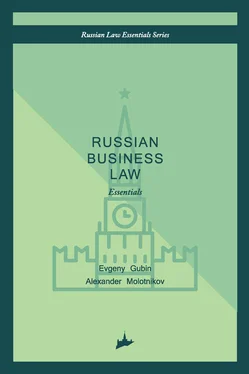Evgeny Gubin - Russian business law - the essentials
Здесь есть возможность читать онлайн «Evgeny Gubin - Russian business law - the essentials» — ознакомительный отрывок электронной книги совершенно бесплатно, а после прочтения отрывка купить полную версию. В некоторых случаях можно слушать аудио, скачать через торрент в формате fb2 и присутствует краткое содержание. Город: Moscow, Год выпуска: 2016, ISBN: 2016, Жанр: foreign_language, Юриспруденция, popular_business, на английском языке. Описание произведения, (предисловие) а так же отзывы посетителей доступны на портале библиотеки ЛибКат.
- Название:Russian business law: the essentials
- Автор:
- Жанр:
- Год:2016
- Город:Moscow
- ISBN:978-5-9904334-9-6
- Рейтинг книги:3 / 5. Голосов: 1
-
Избранное:Добавить в избранное
- Отзывы:
-
Ваша оценка:
- 60
- 1
- 2
- 3
- 4
- 5
Russian business law: the essentials: краткое содержание, описание и аннотация
Предлагаем к чтению аннотацию, описание, краткое содержание или предисловие (зависит от того, что написал сам автор книги «Russian business law: the essentials»). Если вы не нашли необходимую информацию о книге — напишите в комментариях, мы постараемся отыскать её.
Russian business law: the essentials — читать онлайн ознакомительный отрывок
Ниже представлен текст книги, разбитый по страницам. Система сохранения места последней прочитанной страницы, позволяет с удобством читать онлайн бесплатно книгу «Russian business law: the essentials», без необходимости каждый раз заново искать на чём Вы остановились. Поставьте закладку, и сможете в любой момент перейти на страницу, на которой закончили чтение.
Интервал:
Закладка:
This book covers the following areas of the Russian business law:
1. Business Legislation
2. Business Association Forms
3. Core Business Contracts
4. Securities Regulation
5. Banking Regulation
6. Competition
7. Bankruptcy
8. Regulation of Natural Resources
9. Investment Regulation
10. Business Litigation, Arbitration and Other Remedies
Thus, this book provides a comprehensive overview of the ten core areas of Russian business law; in other words, its essentials.
Prof. Dr. Evgeny P. Gubin , Head of Business Law Department Faculty of Law, Lomonosov Moscow State University, Moscow, January, 2016 Alexander Molotnikov , PhD, Associate Professor at Business Law Department, Faculty of Law, Lomonosov Moscow State University, Moscow, January, 2016Alexander Molotnikov, [3] PhD, Associate Professor, Lomonosov Moscow State University Business Law Department
Levon Garslian, [4] University of Pennsylvania Law School, LL. M. 2015; University of Pennsylvania Wharton School, WBLC 2015; Lomonosov Moscow State University, PhD candidate, LL. B. 2012.
Andrei Gabov [5] Doctor of Legal Sciences, Acting Deputy Director of ILCL, Head of the ILCL Civil Legislation and Process Department.
Introduction to Business Law in Russia
Before getting too deep into regulatory details, it seems appropriate and necessary to give a concise historical and conceptual background of Russian business and business law, in order to enable our reader to better understand the current developments.
1. Entrepreneurship Revival
For almost 70 years [6] From 1921 to 1991.
during the existence of the USSR, entrepreneurship was impossible and even illegal. The key feature of the economy in the Soviet period was the "leading role" of the Communist Party. The Soviet economic system had to comply with the principles that the Party proclaimed: one-party leadership, planned economy, state ownership, and high rates of accumulation. To uphold these principals, the use of non-economic coercion could be possible. Thus, the Soviet economy itself was like one large corporation owned by the state and managed by the Communist Party. Only after the fall of the Soviet Union in late 1991 and the transition to the free market economy, one could start thinking about doing business.
The first legal developments towards the revival of entrepreneurship in the Soviet Union took place even earlier, and are related to the passing of such laws of the USSR as "On individual labor activity" (1986), "On cooperation in the USSR" (1988), and "On general fundamentals of citizen entrepreneurship in the USSR" (1991). Entrepreneurship received the most developed legal regulation in legislation of the Russian Federation – in laws of the RSFSR "On companies and enterprise" (1990), "On registration fee for natural persons carrying out entrepreneurship and a procedure of their registration" (1991), “On property in the RSFSR” (1990), the Constitution of 1993, and the Civil Code of the RF.
For a revival of entrepreneurship in the Russian Federation, one had to create corresponding economic-legal prerequisites. They were created stage-by-stage via reformation of the economic system at the legislative level. The core change related to the transformation of property ownership. In conditions of a socialist property domination, where state ownership constituted the basis of the economic system of the USSR. With this form of socialist property, [7] Article 10, 11 of the USSR Constitution of 1977.
the revival and development of entrepreneurship was simply impossible, due to a lack of proprietary forms’ variety, lack of private property, a lack of a market and its participants, and competition.
A new approach to a system of forms of ownership that developed in our country was expressed by passing the law of the USSR of March 6, 1990, "On property in the USSR," and by passing respective version of the Constitution of the USSR. The law of the USSR "On property in the USSR," (article 2.1.) for the first time directly permitted all the owners and so, even citizens to use property belonging to them for any economical or other activity not prohibited by a law. Furthermore, in combination with the right to use the labor of other citizens during exercise of property rights (article 1, paragraph 4), this law essentially opened a way to a revival of entrepreneurship.
Therefore, the adoption of the law of the USSR, "On General Fundamentals of Citizen Entrepreneurship in the USSR," seems very appropriate. Enterprises, buildings, equipment, and other means of production, and any other property have become the objects of the private property.
In the Russian Federation, the Law of the RSFSR of December 24, 1990, "On Property in the RSFSR" in art. 2, paragraph 3, the right of private, state, municipal ownership, as well as of ownership of public associations (organizations) were enshrined. This was the fundamental law which regulated ownership in this period.
The Constitution of 1993 RF recognized and protected in an equal way private, state, municipal and other forms of ownership (part 2 of art. 8); in the Russian Federation, “land and other natural resources can be in a private, state, municipal and other forms of ownership” (part 2 of art. 9).
This provision has been developed in the Civil Code RF, article 18, which is devoted to the legal capacity of citizens, granting them the right "to own the property… to carry out business and other activities not prohibited by laws; create legal entities on their own or together with other citizens and legal entities; conduct any transactions not prohibited by laws." Hence, the Civil Code of the RF includes the key condition of entrepreneurship – the right to carry out business activity. Freedom of labor is another indispensable condition of entrepreneurship, granted by the Constitution of the RF (art. 37).
Thus, by the beginning of the 1990s, the following fundamental conditions, necessary for the existence and development of entrepreneurship, were provided: (1) variety of proprietary ownership (first of all, private property); (2) right to carry out business activity; and (3) freedom of labor.
2. Economic Environment
One could think that after getting the necessary legal capacity for doing business in the early 1990s, nothing else was required for the development of entrepreneurship. In theory, this might be true, but of course, not in practice. The stability and strength of the national economy are the key drivers for the development of business, especially at a starting point. With regard to this, it is important to keep in mind that, in 1991, Russia was just getting into the complex process of transitioning to the market economy.
In the 1990s, the Russian economy experienced a deep recession, accompanied by extremely high inflation, low level of investment, growth of external debt, increase of barters, and many other negative processes. To improve the situation, a series of economic reforms took place, including the liberalization of prices and foreign trade, mass privatization, and other reforms. Nonetheless, in August 1998, Russia announced a default on its state obligations, and refused to support the ruble; in other words, the macroeconomic policy pursued since 1992 had failed.
During the 2000s, another series of reforms, this time with a positive effect, were made in various spheres, inter alia : (1) tax; (2) pension; (3) banking; (4) electricity; (5) railway. Even foreign experts at that time noticed the effectiveness of the reformation processes initiated by President Putin. For instance, the reform of the taxation system was considered a key factor of the economic growth. [8] The Putin Curve, Wall St. J. Online, Nov. 26, 2002, http://www.wsj.com/articles/SB1038271514450758308.
All these processes resulted in Russia finishing the year of 2007 as the seventh largest economy in the world, ahead of Italy and France. [9] Russia is among the seven largest economies in the world (РФ вошла в «семёрку» крупнейших экономик мира), VZGLYAD (ВЗГЛЯД), Feb. 8, 2008, http://vz.ru/news/2008/2/8/143489.html.
Интервал:
Закладка:
Похожие книги на «Russian business law: the essentials»
Представляем Вашему вниманию похожие книги на «Russian business law: the essentials» списком для выбора. Мы отобрали схожую по названию и смыслу литературу в надежде предоставить читателям больше вариантов отыскать новые, интересные, ещё непрочитанные произведения.
Обсуждение, отзывы о книге «Russian business law: the essentials» и просто собственные мнения читателей. Оставьте ваши комментарии, напишите, что Вы думаете о произведении, его смысле или главных героях. Укажите что конкретно понравилось, а что нет, и почему Вы так считаете.












